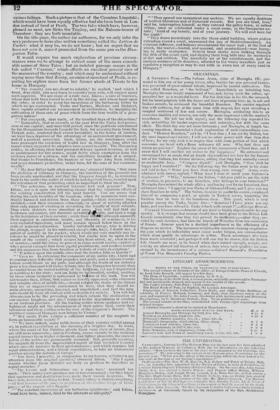GLEANINGS.
A GENEROUS Ttum.—The Sultana Asma, sister of Mustapha III., pre- sented to him one of her young slaves, who, besides her rare personal beauty, was possessed of great natitral talents, improved by careful cultivation. She was called Rouchen, or "the' brilliant." hnmediately on beholding her, Mustapha became deeply enamoured of her, and, laying aside the sultan, ap- proached her asa respectful lover. For the first time in his life, the monarch felt his heart palpitate with the hopes and fears of genuine love, as, in soft and broken accents, he addressed the beautiful Rouchen. The maiden repulsed him with coldness, but at the same time with respect, her eyes revealing a mingled sentiment of fear and sorroW. Mustapha, attributing this to an excessive timidity and reserve, was only the more impressed with the maiden's excellence. He left her with regret; and the following; day repeated his visit, redoubling his tender expressions and entreaties, but with the same effect. The third day was not more fortunate ; and Mustapha, at length be- coming, impatient, demanded a frank explanation of such extraordinary con- duct. " Dearest Rouchen," said he, "I love thee ; I am not thy Sultan, but thy most impassioned adorer; I will use no other power with thee than that of love; for my only wish is to inspire thee with some portion of that which consumes my heart with a flame unknown till now. Why dost thou not return my passion ? Explain the cause of thy repugnance without fear, and swear that I will sacrifice my wishes to thy happiness." He entreated and encouraged her so much, that at length she confessed her love for time Intend- ant of the Sultana, her funnier mistress, adding that they haul mutually vowed an unalterable love. " Compose thyself," said Mustapha, " thou shalt be happy and I wretched !" On the following day the Sultan went to his sister and said to her, " Sister you have done wrong, very wrong." Asma, over- whelmed with terror, replied, "What have I done to merit your highness's displeasure ?" " Why," returned the Sultan, " did you yield to me the right of another, in preseutine• to me Rouchen, who belongs to your Intendant?" Mustapha then related the whole affair ; and having sent for the Intendant, thus addressed him : " I appoint you Paella of Chiouzel-Hissar, and I give you my slave Rouchen to wife." The Sultan, in order to soothe his sorrow, employed himself in composing a gazel. or epistle in Turkish verses, lamenting the fruitless love he bore to the beauteous slave. This gazel, which is very popular among the Turks, begins thus : " Rouchen ! I have given you my heart, a n,1 you have refused it. I take it back with sorrow !"—Furcign Review. CAV'ALRY CUIRASSES.—Armour of any kind is highly objectionable for any cavalry. It is strange that armour should have been given to the British Life Guards immediately after they had proved its, inefficiency,—after they, un- aided by such defences, had torn the laurels of Waterloo from the cuirassiers of France. Armour must be a decided impediment to the efficiency of a dragoon on service. The enormous weight—the constant clearing required— the pain which its inflexibility must cause under fatigue, are circumstances which alone qualify its advantages in action. These advantages also have been much overrated ; and perhaps it will one day be shown, that the British Life Guards are more to be feared when their natural strength, weight, awl -activity are allowed MI freedom of action, than when such qualities are con- strained by the incuinbrance of it cilirasS.—Cuiond ficamish's Transiatiom of Count Inn Bismark's Cavalry Tactics.





















 Previous page
Previous page